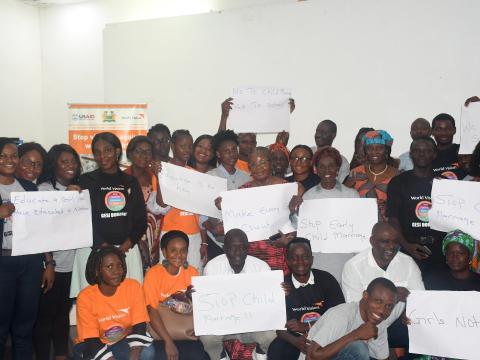The gains of Gender Equality and Social Inclusion (GESI) In Sierra Leone

The Gender Equality and Social Inclusion (GESI) project seek to document and integrate World Vision’s work around gender and livelihood. Funded by USAID, World Vision led a consortium of four; ActionAid (AASL), Advocacy Movement Network (AMNet), and Network Movement for Justice and Development (NMJD) to implement the Women Empowered for Leadership and Development (WELD) project across seven operational districts Falaba, Kono, Koinadugu, Kenema, Makeni, Port Loko and Tonkolili. The WELD project had an overall goal of increasing women’s social, political, and economic rights in Sierra Leone. The Saving for Transformation Group (S4T) is an approach used by the project, to improve the economic rights of women and was later transformed from a savings box to an e-wallet linking the S4T groups with mobile companies to provide mobile money services and save their weekly contribution.
At the end of the WELD project in 2019 World Vision, Sierra Leone received support from World Vision USA to implement GESI to document World Vision’s promising practices on Gender Equality and Social Inclusion in Kono, Koinadugu, Falaba, Tonkolili, and Port Loko districts. From June 2021 to September 2022 the project documented promising practices in the five GESI domains, access, participation, decision-making, systems, and well-being in the WELD operational districts.
During the implementation, promising practices were documented to showcase WVISL work in GESI. Thirty (30) savings for transformation (S4T) groups consisting of over 700 members (80% women) were formed and trained on the S4T model in hard-to-reach communities in the newly established area programs in Falaba and Koinadugu districts in northern Sierra Leone. The group members now have access to loans and the opportunity to improve their financial status. Eighty (80) S4T members are equipped with knowledge of business skills and provided with tools to record daily sales, and loans and calculate profits and losses. The project also trained additional 80 S4T women on reporting and referral pathways to act as advocates for prevention and response to sexual and gender-based violence in their communities.
The project's contribution to child well-being outcomes cannot be overemphasized as stated by members of the S4T groups. “My name is Pa Sorie Fofanah, I am a member of the S4T group created by GESI in Tonkolili. Because of poverty, my children had to drop out of school because I could not afford to settle their school charges. When I joined the S4T group I was able to save and requested for loan from the group to send my children back to school. I believe the future of my children is now secured as education is a major key to development”. Mammie Betty is also an S4T member in Kamara Chiefdom in Kono District. With smiles, she explained her ordeal with the S4T group. “Our group priorities education and with our savings we were able to build a school for our children”. Other parents give testimonies of how the savings for transformation have helped improve household food security with their children being the major beneficiaries.
To showcase and advance emerging evidence based on GESI's promising practices and impact, a learning event was held by WVISL bringing together participants including beneficiaries of the WELD project, government officials, civil society organizations local and international non-governmental organizations, political actors, WVISL staff and other stakeholders. Participants were given a firsthand view of GESI's contribution to national development and also ways of strengthening a common understanding of the opportunities, gaps, and challenges of enhancing gender equality in Sierra Leone. A video presentation and document validation formed part of the learning event.
To further educate the general public about the project radio and television panel discussions were held in Kono district and Freetown in collaboration with the Ministry of Gender and Children’s Affairs. Beneficiaries from the WELD project such as male champions, S4T members, WELD implementing partners, World Vision Communications, and GESI implementing staff were part of the panel.